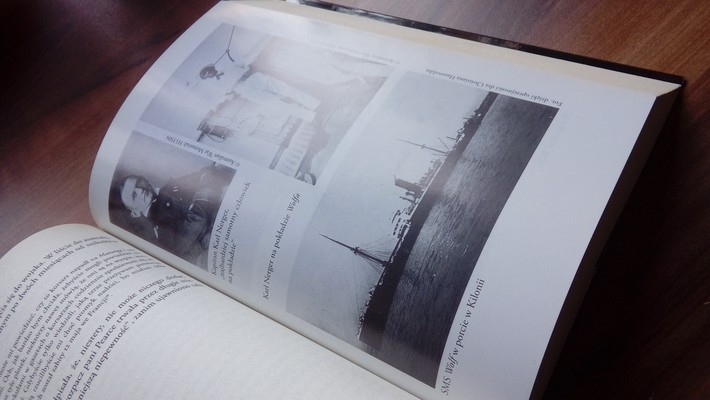'May the living not lose hope. And if need be, they will go one by one to death. As stones thrown by God at the rampart.' ('Stones for the Rampart' by A. Kamiński). Can a man be heroic while facing war, illness, emergency etc?
Agnieszka Serafin - 11.10.2018 @ 16:50
Here you can find my thoughts about the topic.
Heroism amidst war – everyone can become a hero
by Jakub Fenert, VIII LO Kraków/Poland
War. War never changes. For thousands of years it has brought devastation, death and destruction in every place where it appears. It is an embodiment of the worst things that can happen in life. But it’s not alone – loss of loved ones, poverty, sickness, hunger, accidents go alongside with it. Every single one of these factors could break a man. Change him entirely, but not always in a wrong way. In such situations, some people can achieve things which we thought were impossible.
Just like the heroes of the book “Stones for the Rampart” A. Kamińskiego – Alek, Rudy i Zośka – young people just after passing their school-leaving exams. They discarded their chance for a bright future after the war, joining the conspiracy. Heroism, companionship, bravery and a will to sacrifice their own lives – these values accompanied them during the Arsenal operation. They knew what would happen if they failed. Despite the tragic situation in the country, they risked everything to save their friend.
Similar situations aren’t unheard of in other nations, too. Karl August Nerger, Fregatten-Kapitän of SMS “Wolf” ship during First World War received an easy order – ”Go to India and rob Entente ships”. Captain accepted the task, although it sounded like a suicide mission. Problem arose when the ship encountered civilians. Almost every single ship plundered by the German corsair transported ordinary people. The captain was adamant – despite crew’s mutiny and a small coal reserve he accepted more and more people on board. He didn’t allow anyone to be left stranded on the open sea. What’s more, he got those people safely to the port in Kiel.
There’s a lot of people whose virtues are revealed during the worst tragedies. Every nation can be proud of such people. And every one of us can become one. Let’s not lose hope – and we will get out safely out of everything the life throws in our way.
 Karl Nerger, „The loneliest man on the ship” Photo by Jakub Fenert.
Karl Nerger, „The loneliest man on the ship” Photo by Jakub Fenert.
Jakub Fenert - 15.11.2018 @ 18:30
Here is my article. Nice reading ;)
Is there a hero repressed in each of us?
by Pola Palonek, VIII LO Kraków/Poland
History knows many examples of some characters’ heroic behaviours in the face of tragedy. This attitude reveals an incredible spiritual strength of a certain citizen who in the face of tragic events is influenced by emotions. The person makes decisions following his own conscience, regardless the consequences. Usually, undertaken actions are a result of an impulse, and due to lack of time, they’re instinctive reactions. Instant consideration of one’s acts and their meaning is impossible. The question is- is there heroism repressed in each of us? Can it be released by certain situations and circumstances?
The characters of „K” prove themselves heroes during a mission, aiming to free their companion from Gestapo prison. They risk their lives to fight for their values. They don’t consider themselves heroes. What is more, they don’t expect to be perceived as heroes. It is the aim that matters - hope for life in peace. This attitude makes them great role models worth following. It lets us think that all the people are able to be heroes. There’s a certain set of features that a hero has to have: inner strength and the right value system. Only these things let us get over serious illnesses, big failures, dreadful accidents and tragedies.
The ability to be a hero is individual. You can’t predict your behavior and reactions in the face of tragedy. The only thing you can rely on is your own spiritual strength. That’s why we should cultivate and care about it.
 picture by Pola Palonek
picture by Pola Palonek
Pola Palonek - 25.11.2018 @ 21:06
Thanks for your article Kuba! I agree with you that war is the worst possible way of dealing with an international conflict. It is unfair for citizens who have commited no crime whatsoever, but are discriminated, tortured or murdered. I've recently started to read "1984 by George Orwell, I'd like to share a quotation I've come upon.
“War is peace, freedom is slavery, ignorance is strength."
What I like in this book is that everything is so bizzare. What I mean is that everything has been totally turned upside down. It's so ridiculous that it is quite funny! I recommend this book with all my heart.
Marianna Gawron - 02.01.2019 @ 19:15
I really like your view for heroism, but I don't agree with you at all. In one of my favourite song entitled "Unstoppable", is an opinion: "We can be a hero everywhere we go". And I think that this is true. We don't have to save somebody's life, but for instance help in carrying bags, listen to a friend, when he need it, do something hard for you. I can give many examples for a "hero" which is not only a spectacular behaviour but an everyday thing. In every one of us there is something good, so we can do heroic things every day. Sadly, not everyone wants do it, so I think that is why we say "hero is repressed".
Karolina Marona - 02.01.2019 @ 21:35